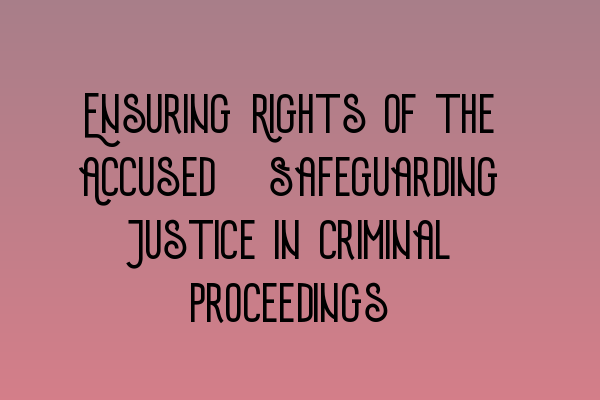Ensuring Rights of the Accused: Safeguarding Justice in Criminal Proceedings
When it comes to criminal proceedings, it is imperative to ensure that the rights of the accused are safeguarded. The justice system revolves around the principle that every individual should have a fair trial, regardless of the nature of the alleged crime. In this blog post, we will explore the importance of ensuring these rights and the steps that can be taken to uphold them.
The Right to Legal Representation:
One of the fundamental rights of the accused is the right to legal representation. Quality legal advice and representation are essential to ensure a fair trial. Hiring an experienced criminal lawyer who understands the intricacies of criminal law can significantly impact the outcome of a case. To prepare for the Solicitors Qualifying Examination (SQE) 1, practice mock exams are an excellent resource to test your knowledge and enhance your understanding of criminal law. Check out these SQE 1 Practice Mocks (FLK1 FLK2) for comprehensive preparation.
The Right to Due Process:
All individuals have the right to due process, which includes fair treatment, a fair trial, and an opportunity to present their case. It is crucial to ensure that the accused is not coerced or forced into making any false statements. Understanding the various stages and procedures of criminal proceedings is vital. If you are aspiring to become a solicitor, thorough preparation for SQE 2 is essential. Enroll in SQE 2 Preparation Courses to gain comprehensive knowledge and enhance your skills.
The Right to Presumption of Innocence:
Presumption of innocence lies at the core of any criminal justice system. It is the belief that every person is innocent until proven guilty. To honor this right, it is necessary to scrutinize the evidence and to ensure that the prosecution can prove the guilt of the accused beyond a reasonable doubt. Familiarize yourself with the potential questions and scenarios through SQE 1 Practice Exam Questions to strengthen your analytical and critical thinking abilities.
The Right to Challenge the Evidence:
The accused has the right to challenge the evidence brought against them. This right allows them to present counter-evidence, cross-examine witnesses, and present any legal arguments to challenge the validity or reliability of the evidence. To be well-prepared for such challenges in the courtroom, it is essential to undergo thorough SQE 1 and SQE 2 exam preparation. Stay updated with the latest SRA SQE Exam Dates to plan your study schedule effectively.
In conclusion, safeguarding the rights of the accused is crucial to maintaining a fair and just criminal justice system. Legal representation, due process, presumption of innocence, and the ability to question evidence are all integral components to ensure justice. Aspiring solicitors must undergo comprehensive preparation for the SQE exams to excel in their profession and contribute to upholding these rights. Remember to take advantage of resources such as SQE 1 Practice Exam Questions, SQE 1 Practice Mocks, SQE 1 and SQE 2 Preparation Courses, and stay updated with the SRA SQE Exam Dates to ensure success.
